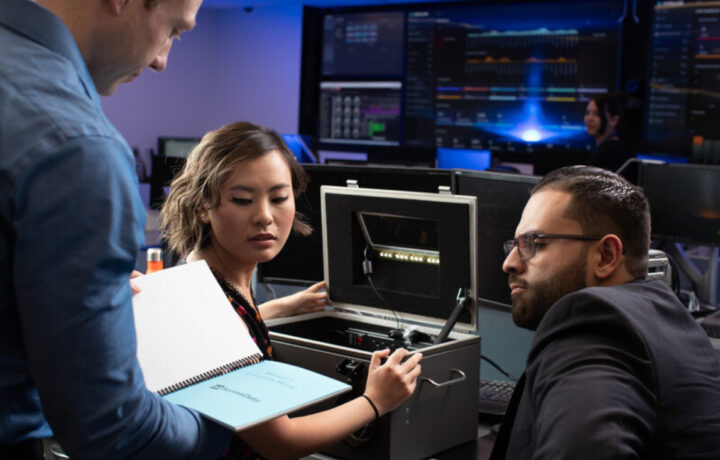The satisfaction of in-person work
Since the pandemic changed the way many workplaces operate, much has been discussed about the benefits of working remotely. There’s increased flexibility, less commuting, and transportation cost savings. But there’s no “one-size-fits-all” answer to work arrangements; remote work simply isn’t for everyone. In fact, there are some benefits of traditional, onsite work that we often overlook in this digital age.
While Booz Allen’s opportunities offer a mix of remote, hybrid, and in-person roles, some of their more confidential missions require additional sensitivity. We spoke to a few of their onsite teammates to find out the top three reasons they prefer in-person work.
1. Opportunities for Collaboration
From instant messaging to email to video calls, there are numerous ways to stay in touch with colleagues when working remotely. However, these don’t always replace those one-to-one conversations and brainstorming sessions that can happen organically when working in person with others.
Dawn Schwarting, a biometrics and forensics engineer at Booz Allen, experiences this firsthand. “Onsite work fosters collaboration. When you get an idea, you can share it with someone sitting next to you instead of scheduling a meeting or sending an email,” says Dawn. “It’s easier to chat through a problem or get an answer to a quick question.”
Investing in the work and the mission is uncomplicated when you’re working on it shoulder to shoulder with others. “Working onsite means I can see the impact of my contributions, and the direct feedback I receive from clients who benefit from my work allows me to constantly sharpen my delivery,” says David Wilson, a cyber threat intelligence analyst. “Many of the most significant things I’ve accomplished wouldn’t have been possible were I not working onsite.”
2. Increased Confidentiality
Booz Allen is known for its partnership with various federal government clients, so many of our missions are sensitive or classified. In fact, many of them may be done onsite in sensitive compartmented information facilities (SCIF). Working in a SCIF typically requires a security clearance as well as other protective measures.
Instructional Designer Sabrina Curry notes that in-person work is particularly helpful in these instances when consultants are working alongside government employees. “Co-mingling government staff and consultants leads to more sharing and earlier observations of systems or processes that could use optimization or streamlining,” she says.
And when in person, all of this can take place with a higher level of security. Working in a SCIF contributes to the success of the overall mission since it helps safeguard sensitive data from adversaries or bad actors.
3. Rapport with Colleagues and Clients
Working with colleagues and clients onsite allows you to get to know them more. It can be difficult for tone, body language, and eye contact to translate through video chat or email. Working in person deepens relationships.
Business Analyst Ann Strohm adds that it can also cut down on errors and misunderstandings. “Working face-to-face during complicated meetings or developer design sessions makes communications move along more smoothly and leaves less room for error,” she says. “In-person interactions build a sense of team and community, allowing each of the members to extend a little more grace toward each other when we can see each other’s faces.”
It’s also particularly rewarding to meet in person when you’re starting a new role, joining a new organization, or transitioning from the military. Working onsite has “demonstrated the full weight of Booz Allen’s welcoming culture. It’s enhanced my transition from the military as well as benefited my career growth,” says David. “Without the cooperation, encouragement, and comradery commonly experienced in my workspace, my career would have been much less fulfilling.”
Find the role—and work arrangement—that’s right for you and your lifestyle.
Join us. The world can’t wait.
Explore Careers



